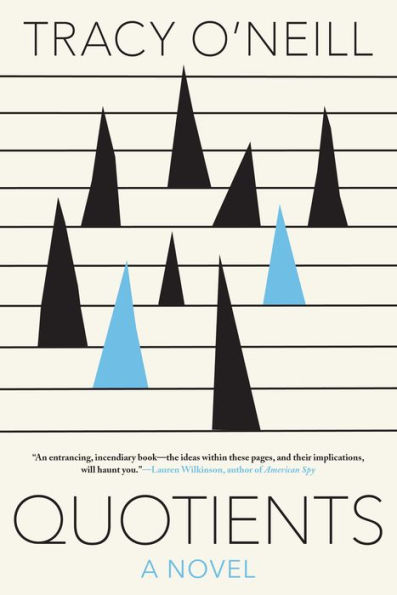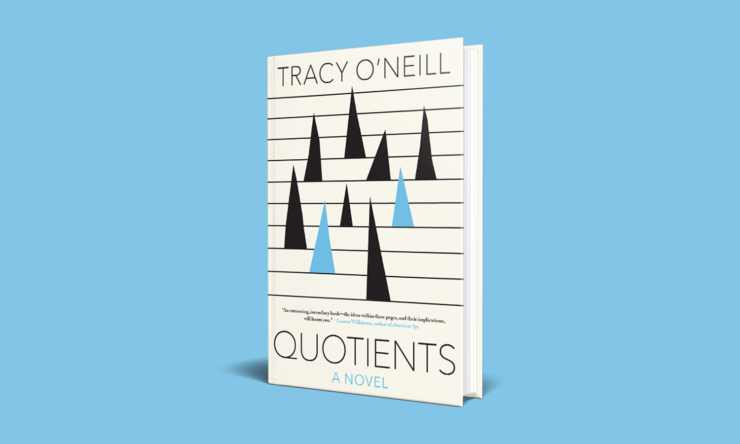Trying to come up with a point of comparison for Tracy O’Neill’s new novel Quotients isn’t easy. Though it—broadly speaking—shares some themes with her debut novel The Hopeful, such as questions of family and identity, the novel takes these in a very different direction. Quotients occupies a similar stylistic place to William Gibson’s Blue Ant trilogy—fiction that skirts the boundaries of science fiction in its handling of technology.
At the center of O’Neill’s novel is a couple: Jeremy Jordan and Alexandra Chen. Alexandra works in image management and consulting; Jeremy used to work in intelligence, and is still haunted by the work he did in Northern Ireland. The novel opens in 2005, and moves gradually towards the present day; running alongside the relationship of Alexandra and Jeremy is the presence of a social network called Cathexis. In a recent interview with BOMB, O’Neill described it as “basically the Facebook of the novel.”
But even before Quotients addresses of surveillance and public presentation in its plot, O’Neill has dipped into the metaphors of social media and online interaction. The novel’s first chapter begins with the neatly disconcerting sentence, “Alexandra Chen saw that they looked at her in search.” And if the sense of that refracted gaze, of looking at someone looking at you through a medium with its own concerns, sounds both dizzying and alienating—that’s the mood that O’Neill taps into across the duration of this novel.
Buy the Book


Quotients
The novel’s plot unfolds elliptically. As Alexandra and Jeremy’s relationship deepens, they ponder marriage and parenthood, and wrestle with their own pasts—Jeremy’s via his intelligence work, and Alexandra’s via her fraught relationship with her brother. Lurking in the background are more unnerving global events, from the bombings in London on July 7, 2005 to the rise of surveillance from both governments and private industry.
O’Neill presents the different sides of her characters to the reader in dramatic ways. Sometimes we see Jeremy as he is to his former colleagues: an ex-spy whose ties to the intelligence community still exist. Sometimes we see him in a very different context: as a social worker seeking to help Tyrell, a young man navigating a difficult home life.
One brief scene involving Tyrell at home serves as a kind of miniature of O’Neill’s concerns. His aunt has brought a guest over—a strange man he’s never met before. He turns out to be his aunt’s new boyfriend; they met online. “Before I was talking to Eddie, I was talking to his persona,” she says—and that divide neatly summarizes so much of what’s taking place in this novel.
In blending meditations on technology with a profound sense of alienation, O’Neill also recalls Don DeLillo’s short story “Human Moments in World War III.” The scenes that occur within Quotients follow familiar trajectories: two people ponder their careers, a reporter ponders their work, a student converses with a social worker. What makes this novel click is the way O’Neill uses language to make familiar events turn into something strange and mysterious:
“The stories from Washington were the stories from Iran or Afghanistan, and they were in their living room, and these days, she told him she felt as though she was always behind, even when she’d arrived. Alexandra was haggarded by stories. She told the stories of vegetable juices and pens that didn’t drag ink; goal: accrue them in the aura of hitting Cathexis Milestones. It was a time when that mattered, hitting Milestones.”
In an interview published in Bookforum, O’Neill discussed the technological elements of the book. “There are moments when smartphones distract from the real possibilities for togetherness, and there are those in which social media offers comfort when a character’s intimates do not,” she observed. What O’Neill has done with Quotients involves finding a new way to write about modern technology, and how its changed people’s ability to perceive the world. It might not sound like science fiction at first, but once you’ve spent some time immersed in the novel’s particular metier, it’s hard to think of it as anything else.
Quotients is available from Soho Press.
 Tobias Carroll is the managing editor of Vol.1 Brooklyn. He is the author of the short story collection Transitory (Civil Coping Mechanisms) and the novel Reel (Rare Bird Books).
Tobias Carroll is the managing editor of Vol.1 Brooklyn. He is the author of the short story collection Transitory (Civil Coping Mechanisms) and the novel Reel (Rare Bird Books).











‘Haggarded’?
@1: Made haggard, one presumes. An unusual construction, but not entirely unprecedented- see Thomas Hardy’s “A Victorian Rehearsal,” which had an actress “…haggarded, in the morning light/By too late-houring overnight.”
Either that or Alexandra is an adult who has been captured to be trained as a hawk, but that sounds like a very different book.